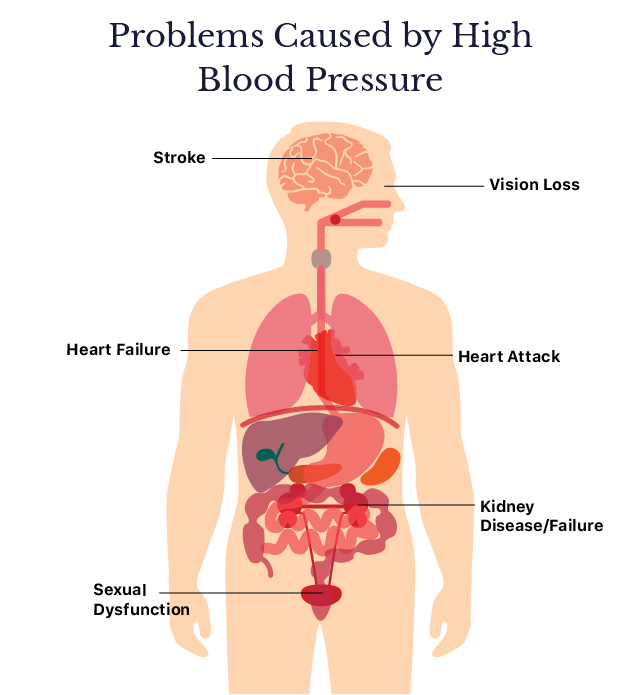It typically takes a few weeks to several months to bring blood pressure down. High blood pressure can be managed through lifestyle changes and medication, but the timeframe for improvement varies depending on the individual's condition and response to treatment.
While some people may see results within a few weeks of making necessary changes, others may require more time to achieve optimal blood pressure levels. Regular monitoring and communication with a healthcare provider are essential to track progress and make necessary adjustments.
By following a comprehensive treatment plan, individuals can gradually lower their blood pressure and improve their overall health and well-being.

Credit: www.drugwatch.com
Factors Affecting The Time To Bring Blood Pressure Down
The time it takes to lower blood pressure can be influenced by various factors, including medication effectiveness, severity of hypertension, individual characteristics, and lifestyle changes. Additionally, consistent monitoring and management can contribute to the speed of blood pressure reduction.
Factors Affecting the Time to Bring Blood Pressure Down When it comes to lowering blood pressure, several factors can influence the time it takes to see results. These factors include diet and lifestyle choices, genetics, medication and treatment, and underlying health conditions.
By understanding how these factors can affect blood pressure, individuals can make informed decisions to help bring their blood pressure down. Diet and lifestyle choices play a crucial role in managing blood pressure.
A healthy diet that is low in sodium, saturated fats, and cholesterol is recommended. Additionally, incorporating foods rich in potassium, such as fruits, vegetables, and whole grains, can help lower blood pressure. Regular physical activity, such as 30 minutes of exercise most days of the week, can also have a positive impact.
By adopting these healthy habits, individuals may see a gradual decrease in their blood pressure over time.
Genetics
Genetics can play a role in determining an individual's susceptibility to high blood pressure. Family history of hypertension can increase the risk of developing high blood pressure. While genetics cannot be changed, awareness of familial predisposition can motivate individuals to take proactive measures in managing their blood pressure.
It is essential for those with a genetic predisposition to maintain regular blood pressure monitoring and adhere to lifestyle modifications and treatment plans recommended by healthcare professionals.
Medication And Treatment
In some cases, lifestyle modifications alone may not be sufficient to lower blood pressure effectively. Medication and treatment options may be necessary to bring blood pressure down to a healthy range.
Antihypertensive medications prescribed by healthcare professionals can help to control blood pressure and reduce the risk of associated complications. The time it takes for these medications to take effect can vary depending on the individual and the specific medication prescribed.
Underlying Health Conditions
Underlying health conditions can contribute to elevated blood pressure levels. Conditions such as kidney disease, diabetes, and obesity can impact blood pressure and may require additional management strategies.
Treating these underlying health conditions through medication, lifestyle changes, or a combination of both can help to bring blood pressure down. It is important to work closely with healthcare professionals to develop an individualized treatment plan that addresses both the underlying condition and high blood pressure.
Overall, the time it takes to bring blood pressure down can vary depending on various factors. By adopting a healthy lifestyle, monitoring blood pressure regularly, and following the guidance of healthcare professionals, individuals can take control of their blood pressure and work towards achieving optimal health.

Credit: www.medicalnewstoday.com
Diet And Lifestyle Choices
When it comes to managing blood pressure, making the right diet and lifestyle choices plays a crucial role. Research indicates that adopting a healthy diet and engaging in regular physical activity can significantly impact blood pressure levels.
Additionally, minimizing stress, getting enough sleep, and avoiding alcohol and tobacco use can also contribute to better blood pressure control. Let’s explore the impact of diet and lifestyle choices on blood pressure in more detail.
Impact Of Diet On Blood Pressure
- Eating a diet rich in fruits, vegetables, whole grains, and lean proteins can help lower blood pressure.
- Reduce sodium intake to less than 2,300 milligrams per day to help manage blood pressure.
- Include potassium-rich foods such as bananas, oranges, and spinach in your diet as they can counteract the effects of sodium on blood pressure.
Role Of Physical Activity
- Engaging in regular physical activity, such as brisk walking, cycling, or swimming, can help lower blood pressure.
- Strive for at least 150 minutes of moderate-intensity aerobic activity per week to promote heart health and manage blood pressure.
- Incorporate strength training exercises at least two days per week to further benefit blood pressure levels.
Effect Of Stress And Sleep
- Practicing relaxation techniques, such as deep breathing exercises or meditation, can help reduce stress and positively impact blood pressure.
- Ensure you get 7-9 hours of quality sleep each night, as inadequate sleep can contribute to high blood pressure.
Alcohol And Tobacco Use
- Limit alcohol consumption to moderate levels, as excessive drinking can raise blood pressure.
- Avoid tobacco use and exposure to secondhand smoke, as these can significantly increase the risk of high blood pressure and related complications.
By making conscious choices related to diet, physical activity, stress management, and substance use, individuals can positively influence their blood pressure levels and overall health.
Medication And Treatment Options
When it comes to managing high blood pressure, there are several effective medication and treatment options available. These options can help achieve healthy blood pressure readings and reduce the risk of complications associated with hypertension. The choice of treatment depends on various factors, including the severity of the condition and the individual's overall health.
Antihypertensive Medications
If your blood pressure readings are consistently high, your healthcare provider may recommend starting antihypertensive medications. These drugs work by relaxing blood vessels, reducing the volume of blood pumped by the heart, or decreasing the amount of fluid in the body to lower blood pressure.
There are different classes of antihypertensive medications:
- Angiotensin-converting enzyme (ACE) inhibitors
- Angiotensin II receptor blockers (ARBs)
- Beta blockers
- Calcium channel blockers
- Diuretics
Your healthcare provider will prescribe the most suitable medication based on your individual needs. It may take some time to find the right medication and dosage that effectively lowers your blood pressure. It is crucial to take the medication as prescribed to maintain optimal control over your blood pressure levels.
Alternative Therapies
In addition to medication, alternative therapies can complement blood pressure management. These therapies include:
- Acupuncture
- Yoga
- Meditation
- Herbal supplements
- Aromatherapy
While alternative therapies may not be as extensively studied as medications, some individuals find them beneficial in managing their blood pressure. It is important to consult with a healthcare professional before starting any alternative therapy to ensure it is safe and suitable for your specific situation.
Lifestyle Modifications
Lifestyle modifications play a key role in managing high blood pressure. Making healthy changes to your daily routine can have a significant impact on bringing blood pressure down. These modifications include:
- Eating a balanced diet rich in fruits, vegetables, whole grains, and lean proteins
- Reducing sodium intake
- Engaging in regular physical activity
- Maintaining a healthy weight
- Limiting alcohol consumption
- Quitting smoking
By adopting these lifestyle changes, you can improve your blood pressure readings and overall cardiovascular health.
Combination Therapies
In some cases, combination therapies may be necessary to effectively manage high blood pressure. Combination therapies involve the use of multiple antihypertensive medications to target different mechanisms contributing to high blood pressure.
Your healthcare provider will determine the appropriate combination therapy based on your specific needs and response to treatment.
In conclusion, the time it takes to bring blood pressure down varies depending on the individual and the treatment approach. Antihypertensive medications, alternative therapies, lifestyle modifications, and combination therapies all play a crucial role in achieving and maintaining healthy blood pressure levels.
It is essential to work closely with your healthcare provider to find the most effective treatment strategy for you.
Managing Underlying Health Conditions
When it comes to managing high blood pressure, it's important to tackle the root cause. By addressing and effectively managing underlying health conditions, such as kidney disease, thyroid disorders, diabetes, and obstructive sleep apnea, you can work towards bringing your blood pressure down to a healthy level.
Impact Of Kidney Disease On Blood Pressure
Kidney disease and hypertension often go hand in hand. The kidneys play a vital role in regulating blood pressure by removing waste and excess fluid from the body. However, when the kidneys are damaged or not functioning properly, blood pressure can rise.
If you have kidney disease, effectively managing it is crucial for bringing your blood pressure down. To do this, your doctor may recommend medications to regulate your blood pressure and protect your kidneys.
In addition to medications, lifestyle changes can also help manage both kidney disease and high blood pressure. This may include following a healthy eating plan low in sodium and monitoring fluid intake.
Thyroid Disorders And Hypertension
The thyroid, a small gland located in the neck, produces hormones that regulate metabolism. When the thyroid is overactive (hyperthyroidism) or underactive (hypothyroidism), it can disrupt the balance in the body and contribute to hypertension.
If you have a thyroid disorder, working closely with your healthcare provider is essential. Treatment options may involve medications to regulate hormone levels and monitor blood pressure. It's important to note that effectively managing your thyroid disorder can be beneficial in bringing your blood pressure down.
Diabetes And High Blood Pressure
Diabetes and hypertension often go hand in hand. High blood sugar levels can damage blood vessels and lead to hypertension. Similarly, uncontrolled high blood pressure can worsen the complications of diabetes.
Managing blood sugar levels through proper diet, exercise, and medications can have a positive impact on blood pressure. Additionally, your doctor may prescribe medications specifically aimed at lowering blood pressure.
Obstructive Sleep Apnea And Hypertension
Obstructive sleep apnea is a sleep disorder where breathing is repeatedly interrupted during sleep due to narrowed or blocked airways. Research has shown a strong association between obstructive sleep apnea and hypertension.
If you have been diagnosed with obstructive sleep apnea, using continuous positive airway pressure (CPAP) therapy consistently can help lower blood pressure. This therapy involves wearing a mask during sleep, which delivers a constant flow of air to keep the airways open.
By effectively managing your underlying health conditions such as kidney disease, thyroid disorders, diabetes, and obstructive sleep apnea, you can support your journey towards reducing your blood pressure to a healthy level. Working closely with your healthcare provider and following their recommendations for medication, lifestyle changes, and other therapies is essential in achieving optimal blood pressure management.

Credit: www.health.harvard.edu
Conclusion
Knowing how long it takes to lower blood pressure is crucial for managing health. By focusing on lifestyle changes and medication, one can effectively bring blood pressure down over time. Through consistent efforts and consulting with healthcare professionals, managing blood pressure is achievable for a healthier life.







0 Comments